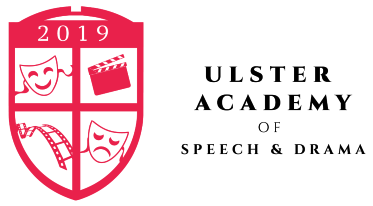Licentiate Diploma
The Licentiate Diploma syllabus allows candidates to develop a deep and thorough knowledge and understanding of the theoretical and practical applications necessary to train individuals who are interested in completing the Junior and Senior Associate Diplomas. On completion of the programme candidates will be qualified to train teachers and examine students up to and including grade 10 for the Ulster Academy and may be invited to become a member of the Academy’s board of directors.
Entry Requirements
- Each candidate must have completed the Junior and Senior Associate Diploma courses with the Ulster Academy or have completed an equivalent course with a recognised examining body.
- Each candidate must have completed a level-8 degree course with a recognised university.
- Each candidate must have a minimum of 3 years’ experience teaching speech and drama.
- Each candidate must be interviewed by a member of the Ulster Academy board and be accepted as a suitable trainee.
- All candidates must have full PSNI/Garda vetting on entry to the programme.
Documentary evidence of the above must be submitted with the candidate’s application.
The Ulster Academy reserves the right to refuse any applicant with the above entry requirements.
Part A
Section 1: Voice Production and Dynamics [100marks]
Each year a poetic or narrative or dramatic text will be presented. Trainees will be expected to respond to the text in the form of a written essay.
Trainees will be expected to analyse and critique the text as appropriate to the genre (e.g. if presented with a poem, the trainee will be expected to demonstrate a knowledge of rhythm, metre, metrical patterns, rhyme, rhyming scheme and figures of speech, as well as demonstrating a knowledge of how the piece should be presented vocally for performance).
Criteria of assessment: sensitivity to and literacy in the genre presented and knowledge demonstrated on how this piece should be presented vocally for performance.
Text and essay title to be submitted will be chosen by the Ulster Academy examining body.
Section 2: Drama/Theatre Criticism and Pedagogy: Theories of Theatre Practice
Part A – [100 marks]
Candidates will be expected to submit an essay of 700-1,000 words on one of the following theorists: Constantin Stanislavski, Berthold Brecht, Michael Chekhov, Anton Chekhov and Jacques Lecoq, or on one of the following influential pyschologists: Jean Piaget, Carl Rogers and Lev Vygotsky.
Criteria of assessment: an understanding of the history of theatre practice, its influential theorists and their impact on child development, psychology and education.
The theorist and essay title to be submitted will be chosen by the Ulster Academy examining body.
Part B – [100 marks]
Candidates will be expected to submit an essay of 700-1,000 words on the application of the theories in drama-in-education by one of the following: Cecily O’Neill, Dorothy Heathcote, Gavin Bolton, Jonathon Neelands, John O’Toole, Peter Brook and Keith Johnstone.
Criteria of assessment: Candidates will be expected to relate their essay to their own current teaching practice.
The theories and essay title to be submitted will be chosen by the Ulster Academy examining body.
Section 3
Part A: Contemporary Irish Theatre [100 marks]
Candidates will be expected to submit an essay of 700-1,000 words on works of one of the following playwrights: Marina Carr, Martin McDonagh, Sebastian Barry, Marie Jones, Brian Friel, Billy Roache, Enda Walsh, Stewart Parker and Tom Murphy.
Criteria of assessment: the candidate must show an ability to critique and analyse the work in relation to the political, social and cultural landscape at the time the play was written.
The playwright and essay title to be submitted will be chosen by the Ulster Academy examining body.
Part B: Contemporary Irish Poets [100 marks]
Trainees will be expected to submit an essay of 700-1,000 words on works of one of the following poets: Paula Meehan, Catriona O’Reilly, Eavan Boland, John Hewitt, Michael Longley, Paul Muldoon, Derek Mahon and Mary O’Donnell.
Criteria of assessment: Trainees must show an understanding of contemporary Irish poets, the political, social and cultural landscape at the time of writing and their impact on the poet’s writing.
The poet and essay title to be submitted will be chosen by the Ulster Academy examining body.
Learning Outcomes
Having completed the Licentiate Diploma, the participant should have:
- acquired a core knowledge of the major and influential theatre theorists, their practices and influence on theatre in Ireland.
- acquired an ability to analyse and critique poetry, dramatic text, prose and any narrative with regard to genre, social, cultural and political influences of its time.
- acquired a core knowledge of the major and most influential drama-in-education theories and praxis and the major influences they have had on primary and secondary school education in Ireland and Europe.
- acquired a core knowledge of the major psychologists, their theories and practices and how these have influenced childhood development and education.
- become an experienced drama practitioner and put into practice the techniques and strategies of drama-in-education in his/her own speech and drama setting.
- gained an excellent knowledge of the key elements of voice production, with particular reference to the theatre and poetry speaking.
- a core knowledge of the history of theatre through the centuries up to and including contemporary Irish theatre.
- the tools to be an able and consistent examiner of young students from elementary to grade 10 examinations with the Ulster Academy syllabus.
- gained an excellent knowledge of the necessary skills and techniques needed to train teachers for the Junior Associate Diploma and Senior Associate Diploma with the Ulster Academy syllabus.
